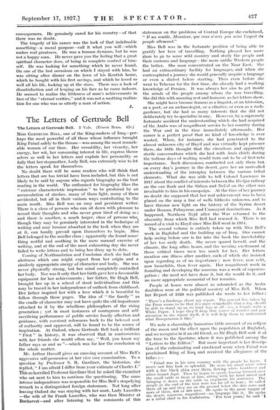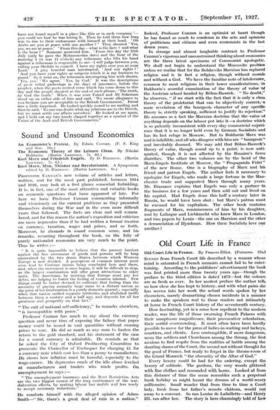The Letters of Gertrude Bell
MISS GERTRUDE BELL, one of the King-makers of Iraq—per- haps the most powerful of all those whose influence brought King Faisal safely to the throne—was among the most remark- able women of our time. Her versatility, her vivacity, her energy, her wit, her consuming interest in life, express them- selves so well in her letters and explain her personality so fully that her stepmother, Lady Bell, was extremely wise to let the letters speak for themselves.
No doubt there will be some readers who will think that letters that are too trivial have been included, but this is not likely to be said by anyone who regards biography as the best reading in the world. The enthusiast for biography likes the "extreme characteristic impression" to be produced by an accumulation of strokes, many of them light, many of them accidental, but all in their various ways contributing to the main result. Miss Bell was an easy and persistent writer. There is a class of persons who can sit down with pleasure to record their thoughts and who never grow tired of doing so ; and there is another, a much larger, class of persons who, though they may be genuinely interested in the technique of writing and may become absorbed in the task when they are at it, can hardly prevail upon themselves to begin. Miss Bell belonged to the snialler class ; apparently she found some- thing restful and soothing in the mere manual exercise of writing, and at the end of the most exhausting day she never failed to write letters and to bring her diary up to date.
Coming of Northumbrian and Cumbrian stock she had the alertness which one might expect from her origin and a similarly appropriate energy of character and body. She was never physically strong, but her mind completely controlled her body. Nor was it only that her birth gave her a favourable equipment for her achievements ; her father, Sir Hugh Bell, brought her up in a school of stout individualism and this may be traced in her independence of outlook from childhood. Her father inspired her with a love which it is beautiful to follow through these pages. The idea of "the family" as the cradle of character may not have quite the old importance attached to it by the rebellious philosophers of the rising generation ; yet in most instances of courageous and self- sacrificing performance of public service family affection and guidance, with constant references back to the beloved seat of authority and approval, will be found to be the source of inspiration. At Oxford, where Gertrude Bell took a brilliant " First " in history, it was observed that in controversies with her friends she would often say, "Well, you know my father says so and so "—which was for her the conclusion of the whole matter.
Mr. Arthur Hassan gives an amusing account of Miss Bell's aggre.ssive self-possession at her viva voce examination. To a question by Professor S. R. Gardiner, the historian, she replied, " I am afraid I differ from your estimate of Charles I." This so horrified Professor Gardiner that he asked the examiner who sat next to him to continue the questioning. The same intense independence was responsible for Miss Bell's stupefying remark to a distinguished foreign statesman. Not long after leaving Oxford she was staying with her aunt, Lady Lascelles —the wife of Sir Frank Lascelles, who was then Minister at Bucharest—and after listening- to the comments of this
statesman on the problems of Central Europe she exclaimed, me semble, Monsieur, que vows n'avez pas saisi resprit du peuple allemand."
Miss Bell was in the fortunate position of being able to gratify her love of travelling. Nothing pleased her more than to go to some wild country and study the people and their customs and language—the more unlike Western people the better. She soon concentrated on the Near East. She had an extraordinary facility for languages, and when she contemplated a journey she would generally acquire a language or even a dialect before starting. Thus even before she went to Teheran for the first time, she already had a working knowledge of Persian. It was always her aim to get inside the minds of the people among whom she was travelling. She did this with amazing zest and humour, as her letters show.
She might have become famous as a linguist, or an historian, or a poet, or an archaeologist, or a climber, or even as a rock- gardener, but she had so many interests that she did not deliberately try to specialize in any. However, by a supremely fortunate accident the understanding which she had acquired of the Arabs was of magnificent service to her country during the War and in the time immediately afterwards. Her career is a perfect proof that no kind of knowledge is ever wasted. When, for instance, she had penetrated to the almost unknown city of Hayil and was virtually kept prisoner there, she little thought that the circuitous and apparently sterile conversations which she had with Arab chiefs during the tedious days of waiting would turn out to be of first-rate importance. Such discussions, conducted not only there but on every day's journey in the desert, gave her an unrivalled understanding of the interplay between the various tribal elements. What she was able to tell Colonel Lawrence in 1917 about the conflict of interests between the Hedjaz railway on the one flank and the Sirhan and Nen(' on the other was invaluable to him in his campaign. At the time of her journey no doubt she supposed that her real achievement was to have placed on the map a line of wells hitheito unknown, and to have thrown new light on the history of the Syrian desert under Roman, Palmyrene, and limmayad dominations. As it happened, Northern Nejd after the War returned to the obscurity from which Miss Bell had rescued it. There is no record of a visit to Hayil since Miss Bell went in 1914.
The second volume is entirely taken up with Miss Bell's work in Baghdad and the building up of Iraq. One cannot help seeing before one is far into the book the inevitability of her too early death. She never spared herself, and the climate, the long office hours, and the wearing excitement of those critical times were too much for her. Her letters mention one illness after another, each of which she insisted upon regarding as of no importance ; now fever, now cold, now bronchitis, then fever again. Her magnificent work in founding and developing the museum was a work of superero- gation ; she need not have done it, but she would do it, and no more appropriate memorial of her remains.
People at home were almost as astounded as the Arabs doubtless were at the political mastery of Miss Bell. When her Report of 1920 was published she wrote to her father : "There's a fandango about my report. The general line taken by the Press seems to be that it's most remarkable that a clog should be able to stand up on its hind legs at all—i.e.. a female write a White Paper. I hope they'll drop that source of wonder and pay attention to the report itself, if it will help them to understand what Mesopotamia is like."
We note a charmingly humorous little account of an eclipse of the moon and the effect upon the population at Baghdad, and we recognize in it an old friend, as Sir Hugh Bell sent it at the time to the Spectator, where it was published among the "Letters to the Editor." But more important is her descrip- tion of the culminating and emotional scene when Faisal was proclaimed King of Iraq and received the allegiance of the tribes :— "Faisal was in his own country with tho people he knew. I never saw him look so splendid. He wore his usual white robes with a fine black abba over them, flowing white headdress and silver bound Aqal. Then he began to speak, lemming forward over the small table in front of him, sitting with his hand raised an bringing it down on the table to emphasize his sentences. 77 (? people at the end of the tent were too far off to hear, ho calkd them all up and they sat on the ground below tho dais rows and rows :1 them, 400 or 500 men. He spoke in the great tongue of the s c'desert, sonorous, magnificent—no language like it. He spoke as a tribal chief to his feudatories. ' For four years, he said I
have not found myself in a place like this or in such company '- you could see how he was loving it. Then he told them how Iraq was to rise to their endeavours with himself at their head. 'Oh Arabs are you at peace with one another?' They shouted 'Yes, yes, we are at peace. 'From this day—what is the date ? and what is the hour?' Someone answered him. 'From this day the 25th July (only he gave the 'Mohammedan date) and the hour of the morning 4 (it was 11 o'clock) any tribesman who lifts his hand against a tribesman is responsible to me—I will judge between you, calling your Sheikhs in council. I have my rights over you as your
Lord. A grey bearded man interrupted, 'And our rights ? ' 'And you have your rights as subjects whieh it is my huffiness to guard.' So it went on, the tribesmen interrupting him with shouts, Yes, yes,' `.We agree," Yes, by God.'- It was the descriptions of great tribal gatherings in the days of ignorance, before the prophet, when the poets recited verse which has come down to this -day and the 'people shouted at the end of each phrase, 'The truth, by God the truth.' When it, was over Fahad and Ali Suleiman stood up on either side_ of him and said, 'We swear allegiance to
you because you are acceptable to the British Government. Faisal -was a little surprised. Be looked quickly round to me smiling and then he said, ' No one can doubt what my relations are to the British,
but we must settle our .affairs ourselves.' He looked, at me again, wid I held out my two hands clasped together as a symbol of the Union: of the Arab and British Governments."















































 Previous page
Previous page